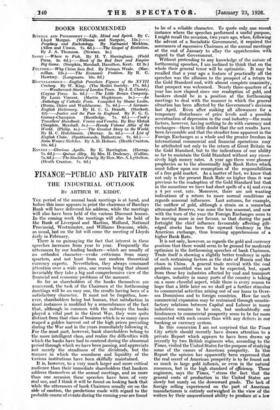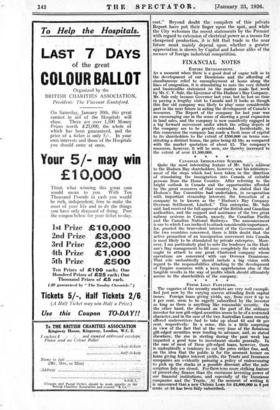FINANCE-PUBLIC AND PRIVATE
THE INDUSTRIAL OUTLOOK
BY ARTHUR W. KIDDY.
TILE period of the annual bank meetings is at hand, and before this issue appears in print the chairman of Barclays Bank will have delivered his address, while the meetings will also have been held of the various Discount houses. In the coming week the meetings will also be held of the Bank of Liverpool and' Martins, Midland, National Provincial, Westminster, and Williams Deacons, while, as usual, last on the list will come the meeting of Lloyds early in February.
There is no gainsaying the fact that interest in these speeches increases from year to year. Frequently the utterances by our leading bankers—which are usually of an orthodox character—evoke criticisms from many quarters, and not least from our modern theoretical Currency experts. Nevertheless, they always command attention over a wide area, one reason being that almost invariably they take a big and comprehensive view of the Financial and economic problems of the moment.
So far as shareholders of the banks themselves are concerned, the task of the Chairmen at the forthcoming meetings will be an easy one, the results having been of a satisfactory character.. It must not be forgotten, how- ever, shareholders being but human, that satisfaction in most instances is modified by a remembrance of the fact that, although in common with the railways the banks Played a vital part in the Great War, they were quite distinct from that class of business which in so many cases reaped a golden harvest out of the high prices prevailing during the War and in the years immediately following it. For the most part, however, bank shareholders belong to the more intelligent class, and realize the difficulties with which the banks have had to contend during the abnormal, period through which we have been passing, and appreciate not merely the steadiness of the dividends, but the- manner in which the soundness and liquidity of the various institutions have been, skilfully maintained. It is, however, to a very much larger and more critical audience than their immediate shareholders that bankers_ address themselves at the annual meetings, and on more than one occasion these speeches have been of very real use, and I think it will be found on looking back that while the utterances of bank Chairmen usually err on the side of caution, the predictions made with regard to the probable course of events during the ensuing year are found to be of a reliable character. To quote only. _one recent instance where the speeches performed a useful purpose, I might recall the occasion, two years ago, when, following the advent of a Socialistic Government, it required the assurances of successive Chairmen at the annual meetings at the end of January to allay the apprehension with regard to that Government.
Without pretending to any knowledge .of the nature of forthcoming speeches, I am inclined to think that on the whole their general tenor will be optimistic. It may be recalled that a year ago a feature of practically all the speeches was the allusion to the prospect of a return to the Gold Standard and, with almost complete unanimity, that prospect was welcomed. Nearly three-quarters of a year has now elapsed since our readoption of gold, and bankers should be in a position at the forthcoming meetings to deal with the manner in which the general situation has been affected by the Government's decision last April. Even after making all allowances for a temporary disturbance of price levels and a possible accentuation of depression in the coal industry—the main factors, however, having nothing to do with currency and exchanges—there is little doubt that the net results have been favourable and that the steadier tone apparent in the Foreign Exchanges as a whole and the greater freedom in international commercial and financial operations may be attributed not only to the return of Great Britain to the Gold Standard, but to the indications of our ability so far to maintain the Gold Standard without any exces- sively high money rates. A year ago there were gloomy prophecies as to the abnormally high Bank Rates which must follow upon our resumption of the responsibilities of a free gold market. As a matter of fact, we know that not only is the present Bank Rate no higher than it was previous to the readoption of the Gold Standard but that in the meantime we have had short spells of a 41 and even a 4 per cent. rate. Moreover, there are not wanting indications of a return to `more normal conditions as regards seasonal influences. Last autumn, for example, the outflow of gold, although a strain on a somewhat attenuated Reserve, was none the less seasonal, and now with the turn of the year the Foreign Exchanges seem to be moving more in our favour, so that during the past fortnight the chief influence favourably affecting gilt- edged stocks has been the upward tendency in the American exchange, thus lessening apprehensions of a higher Bank Rate.
It is not only, however, as regards the gold and currency position that there would seem to be ground for moderate optimism in the forthcoming speeches of bank Chairmen. Trade itself is showing a slightly better tendency in spite of such restraining factors as the state of Russia and the chaos in China. A general trade revival with the coal problem unsettled was not to be expected, but, apart from those key industries affected by coal and transport charges, industry in many parts of the country is taking on a more cheerful aspect, while there is every reason to hope that a little later on we shall get a further stimulus to commercial activities arising out of our loans to Over- sea Dominions and to foreign countries. How far such commercial expansion may be restrained through unsatis- factory relations between Capital and Labour in many industries remains to be seen, but undoubtedly our hindrances to commercial prosperity seem to be far more connected with such causes than with any defects in our banking or currency system.
In this connexion I am not surprised that the Times City article should recently have drawn attention to a private Report which appears to have been drawn up recently by two British engineers who, according to the Times, visited the United States for the purpose of studying some of the causes of American prosperity. In this Report the opinion has apparently • been expressed that the real secret of American prosperity is to be found not so much in large gold influxes, or even in the natural resources, but in the high standard of efficiency. These engineers, says the Times, " stress the fact that the general costs of production in the United States are slowly but surely on the downward grade. The lack of foreign selling experienced on the part of American manufacturers is entirely outweighed in the view of the writers by their unquestioned ability to produce at a low 'cost." Beyond doubt the compilers of this private Report have put their finger upon the spot, and while the City welcomes the recent statements by the Premier With regard to extension of electrical power as a means for cheapened production, it is felt that trade in the near future must mainly depend upon whether a greater appreciation is shown by Capital and Labour alike of the menace of foreign industrial competition.











































 Previous page
Previous page